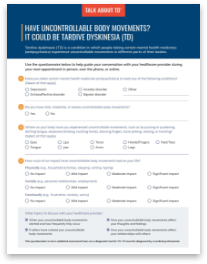
Actor portrayals
Treatment may help you manage your uncontrollable body movements from TD
No matter if you have mild, moderate, or severe uncontrollable body movements, the first step on your treatment journey is talking with a healthcare provider.
While your primary care physician may be the healthcare provider you’re used to seeing, they may refer you to a psychiatrist, neurologist, or other provider who has more experience diagnosing and treating tardive dyskinesia (TD). Find a healthcare provider with experience diagnosing and treating TD by using the Find a Specialist Locator below.
Because there are different kinds of movement disorders, it’s important to figure out what movement disorder might be affecting you. This is an important step to finding the right treatment plan because some medicines are recommended for specific conditions or specific movement disorders. It’s important to find a treatment that’s right for you.

What is a goal of TD treatment?
TD is thought to be caused by too much dopamine signaling in the brain. A goal of TD treatment is to reduce extra dopamine signaling and TD movements.

Actor portrayals
What is a recommended type of prescription medicine Used to treat TD?
The type of prescription medicine recommended to treat TD is a VMAT2 inhibitor.
VMAT2 inhibitors can be taken once or twice per day depending on which treatment your healthcare provider prescribes. These medicines are thought to reduce extra dopamine signaling in the brain.
TD Treatment options are available.
Learn about a prescription medicineYour healthcare provider might consider stopping, adjusting, or switching your mental health medicine to manage your TD for a number of reasons. If they do, they may keep an eye on a few things like:
- If your symptoms have improved
- If your symptoms improve for a short period of time and then return
- Your mental health and how you’re feeling overall
It's important to speak to your healthcare provider and continue to discuss appropriate treatment options if your symptoms don't improve
Did you know?
Anticholinergic medicines (such as benztropine) are approved to treat other movement disorders, but they are not approved to treat TD. Your healthcare provider may prescribe you an anticholinergic medicine depending on your diagnosis. If you have TD and are on an anticholinergic but still experiencing uncontrollable movements, it's important to talk to your healthcare provider.


Actor portrayal
Learn more about TD and how to start a conversation with your healthcare provider about TD diagnosis and treatment.
Sign up for InfoTalk to your HEALTHCARE PROVIDER
some things to discuss include:
The location of your uncontrollable body movements
When your uncontrollable body movements started and how frequently they occur
If others have noticed your uncontrollable body movements
The impact of these uncontrollable body movements on your daily routine
How these uncontrollable body movements affect your thoughts and feelings
How these uncontrollable body movements affect your relationships with others
The talking points above can help give your healthcare provider a better understanding of your uncontrollable body movements, how they are impacting you, and if they are TD. You can also record short videos of your uncontrollable body movements to show your healthcare provider. Your healthcare team can help you create a treatment plan that is right for you.

Ready to talk to your healthcare provider about TD or TD treatments?
You can use the Doctor Discussion Guide to get helpful info on how to have a productive in-person or telemedicine appointment.
Looking to take the first step in managing your uncontrollable body movements? Talk to a specialist.
Find psychiatrists, neurologists, and other advanced-practice healthcare providers experienced with diagnosing and treating TD. Talk about your uncontrollable body movements with them and learn about treatments that could help you manage TD.

Jeff, a real patient living with TD
Do you know someone who may have TD?
Here are some tips for TD support:
- Educate yourself on the cause and impact of TD
- Know what TD looks like and how to recognize it
- Keep an eye out for the signs and symptoms of TD